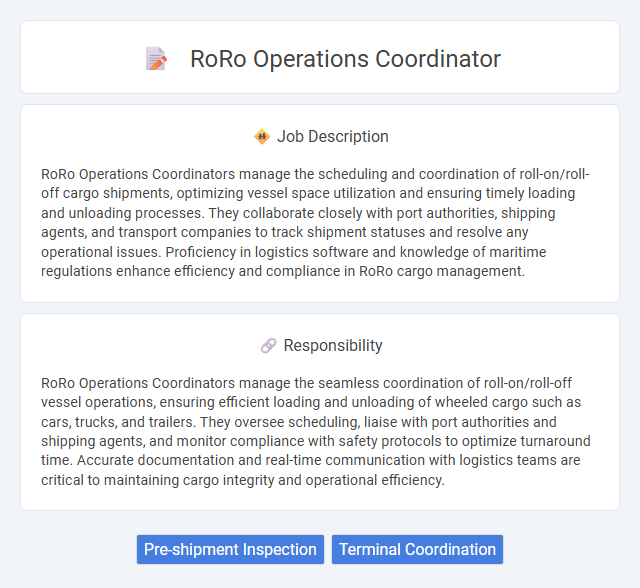
RoRo Operations Coordinators manage the scheduling and coordination of roll-on/roll-off cargo shipments, optimizing vessel space utilization and ensuring timely loading and unloading processes. They collaborate closely with port authorities, shipping agents, and transport companies to track shipment statuses and resolve any operational issues. Proficiency in logistics software and knowledge of maritime regulations enhance efficiency and compliance in RoRo cargo management.
Individuals with strong organizational skills and a high tolerance for fast-paced environments are likely to succeed as RoRo Operations Coordinators. Those who thrive on coordinating logistics, managing schedules, and solving operational challenges in maritime transport may find this role suitable. Candidates who prefer routine tasks and limited interaction might struggle, as the position often requires adaptability and effective communication under pressure.
Qualification
A RoRo Operations Coordinator must have a strong understanding of roll-on/roll-off vessel procedures and maritime logistics. Essential qualifications include proficiency in shipping documentation, cargo handling coordination, and experience with port operations software. Strong communication skills and the ability to manage scheduling and compliance with international shipping regulations are critical for success in this role.
Responsibility
RoRo Operations Coordinators manage the seamless coordination of roll-on/roll-off vessel operations, ensuring efficient loading and unloading of wheeled cargo such as cars, trucks, and trailers. They oversee scheduling, liaise with port authorities and shipping agents, and monitor compliance with safety protocols to optimize turnaround time. Accurate documentation and real-time communication with logistics teams are critical to maintaining cargo integrity and operational efficiency.
Benefit
RoRo Operations Coordinator roles likely offer significant benefits such as enhanced career growth in logistics and supply chain management, given the specialized nature of roll-on/roll-off shipping processes. Professionals in this position probably gain valuable hands-on experience coordinating vessel schedules, improving operational efficiency, and ensuring cargo safety, which may boost employability in maritime industries. The role might also provide exposure to international trade regulations and teamwork in fast-paced environments, contributing to skill development and professional advancement.
Challenge
RoRo Operations Coordinator roles likely involve managing complex logistics challenges to ensure the smooth movement of roll-on/roll-off cargo. Coordinating vessel schedules, cargo handling, and regulatory compliance may require problem-solving under tight deadlines and adapting to unexpected disruptions. Effective communication and proactive planning are probably essential to navigate the dynamic environment and minimize operational risks.
Career Advancement
RoRo Operations Coordinators play a crucial role in managing roll-on/roll-off vessel logistics, ensuring efficient cargo handling and timely deliveries. Mastery of port operations and supply chain coordination in this role paves the way for advancement to senior operations management or logistics supervisor positions. Gaining expertise in RoRo processes and industry regulations significantly enhances career prospects within maritime logistics and transportation sectors.
Key Terms
Pre-shipment Inspection
RoRo Operations Coordinators specialize in managing the logistics of Roll-on/Roll-off cargo, ensuring efficient vessel loading and unloading processes. Pre-shipment inspection involves verifying vehicle condition, documentation accuracy, and compliance with shipping standards to prevent delays or damages. Proficient coordination with port authorities and inspection agencies ensures timely clearance and smooth transit of goods.
Terminal Coordination
RoRo Operations Coordinators oversee terminal coordination to manage the efficient loading and unloading of roll-on/roll-off vessels, ensuring seamless vehicle and cargo flow within port facilities. They collaborate closely with stevedores, shipping agents, and customs officials to optimize berth allocation, cargo staging, and turnaround times. Proficient use of terminal operating systems and real-time tracking enhances operational accuracy and minimizes delays.
 kuljobs.com
kuljobs.com